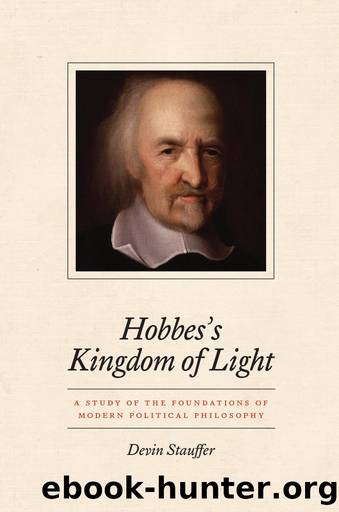Hobbes's Kingdom of Light: A Study of the Foundations of Modern Political Philosophy by Devin Stauffer

Author:Devin Stauffer [Stauffer, Devin]
Language: eng
Format: epub
Tags: Philosophy, History & Theory, Political Science, Political, General
ISBN: 9780226553061
Google: iglkDwAAQBAJ
Goodreads: 36217461
Publisher: University of Chicago Press
Published: 2018-08-02T00:00:00+00:00
6
Hobbesâs Political Philosophy I: Man and Morality
Let us begin our examination of Hobbesâs political philosophy by returning to a question that we began to consider much earlier, at the beginning of Chapter 2: the question of the relationship between Hobbesâs political philosophy and his natural philosophy. In our earlier consideration of this question, we pursued it far enough to begin to see how complicated it is. To recall the basic puzzle: by announcing (and never renouncing) his ambition to produce a tripartite system that moves from body to man to citizen, Hobbes suggests that he conceived of his political philosophy as dependent on and even derivative from his natural philosophy. Yet, by declaring that the third part of his projectâhis political philosophy properâcould be severed from the other two parts and presented first (in De Cive), he suggests that his political philosophy is independent, in its foundation and principles, from his natural philosophy (see p. 36 above and the passages cited there). Now, as I indicated earlier, the apparent contradiction in Hobbesâs direct remarks about his tripartite project is only the beginning of the difficulty of making sense of the relationship between his political philosophy and his natural philosophy. We need now to plunge more deeply into the problemâa problem with which Hobbes scholars have long struggled and over which they have come to widely divergent conclusions. The struggle and the disagreement are understandable, because Hobbes himself does not offer a clear resolution of the problem. One is forced to sift through conflicting evidence, and some measure of speculation is unavoidable.
The evidence that Hobbes did regard his political philosophy as derivative from his natural philosophy is not limited to those remarks in which he speaks of his ambition to create a tripartite system encompassing the âelementsâ of philosophy. Hobbes also makes other statements that indicate more explicitly that he conceived of the parts or branches of philosophy as having a necessary order, in which the later parts are dependent on the earlier ones. The most striking such statement is in Chapter 6 of De Corpore, where Hobbes speaks most directly of the procedure to be followed as one moves from one part of philosophy to the next. In this chapter, âOf Method,â Hobbes suggests that physics, as the culmination of natural philosophy, must follow a prior study of âfirst philosophyâ and a form of geometry that is directed above all to the understanding of motion. But more important for present purposes is what he says about what comes after physics: âAfter physics, one comes to moral philosophy (moralia), in which part of philosophy one considers the motions of the mind, namely, appetite, aversion, love, benevolence, hope, fear, anger, emulation, envy, etc., what causes they have, and of what they are causes. The reason why these are to be considered after physics is that they have their causes in sense and imagination, which are subjects of physical contemplationâ (De Corp. 6.6). This statement and others that would seem to corroborate it (see above all De Corp.
Download
This site does not store any files on its server. We only index and link to content provided by other sites. Please contact the content providers to delete copyright contents if any and email us, we'll remove relevant links or contents immediately.
The remains of the day by Kazuo Ishiguro(8956)
Tools of Titans by Timothy Ferriss(8354)
Giovanni's Room by James Baldwin(7308)
The Black Swan by Nassim Nicholas Taleb(7092)
Inner Engineering: A Yogi's Guide to Joy by Sadhguru(6779)
The Way of Zen by Alan W. Watts(6584)
Asking the Right Questions: A Guide to Critical Thinking by M. Neil Browne & Stuart M. Keeley(5745)
The Power of Now: A Guide to Spiritual Enlightenment by Eckhart Tolle(5736)
The Six Wives Of Henry VIII (WOMEN IN HISTORY) by Fraser Antonia(5490)
Astrophysics for People in a Hurry by Neil DeGrasse Tyson(5172)
Housekeeping by Marilynne Robinson(4428)
12 Rules for Life by Jordan B. Peterson(4293)
Double Down (Diary of a Wimpy Kid Book 11) by Jeff Kinney(4254)
The Ethical Slut by Janet W. Hardy(4235)
Skin in the Game by Nassim Nicholas Taleb(4228)
Ikigai by Héctor García & Francesc Miralles(4228)
The Art of Happiness by The Dalai Lama(4118)
Skin in the Game: Hidden Asymmetries in Daily Life by Nassim Nicholas Taleb(3983)
Walking by Henry David Thoreau(3943)
